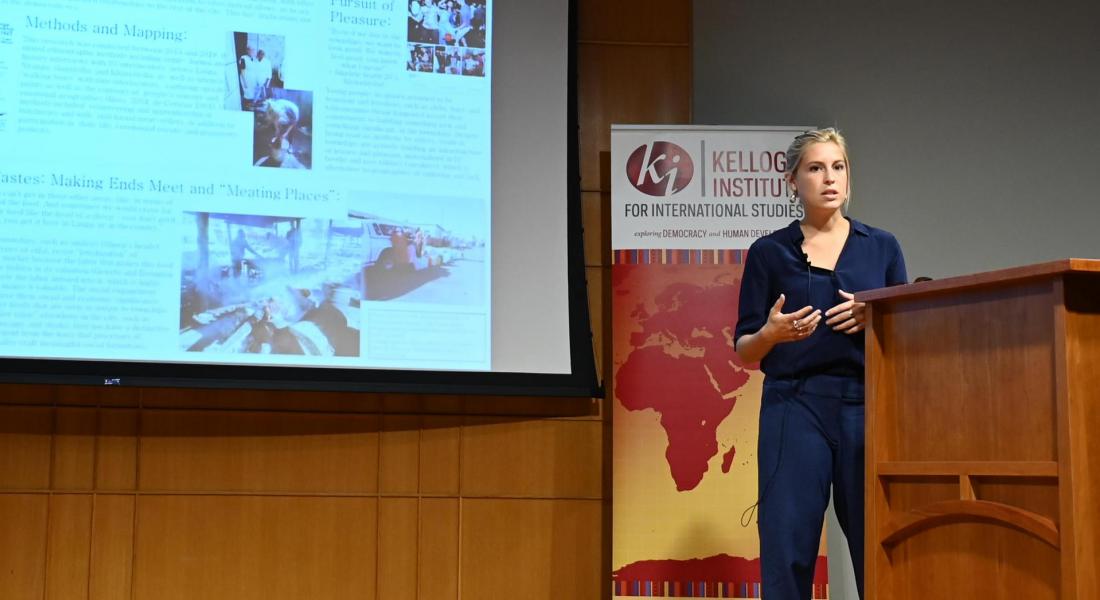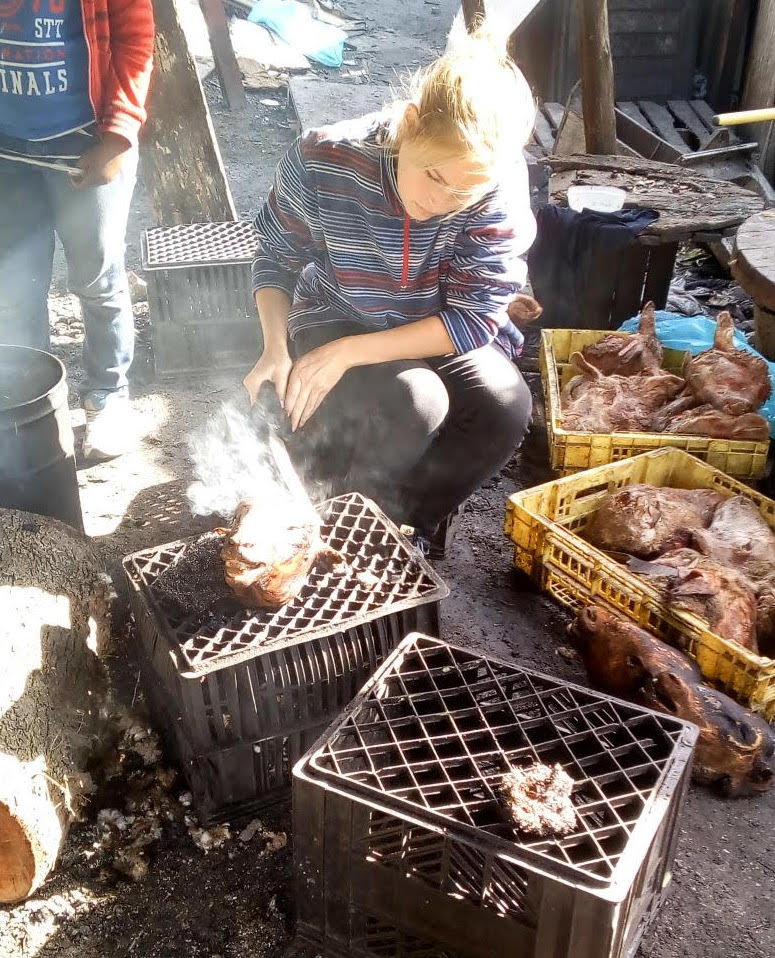
Twenty-five years after the end of apartheid, South Africa’s townships – crowded urban slums established under apartheid-era policies – remain synonymous with grinding poverty, high crime rates, and a lack of access to clean water and other basic infrastructure. Today, as during the decades of legalized segregation, most of the millions of South Africans who live in townships are black.
But Dissertation Year Fellow Emily de Wet, an anthropologist, believes there is more to townships than the hardships brought on by lingering racial and structural inequalities within the country. In her dissertation, “Oh I Love the Vibe: Complicating Discourses Around Life in Cape Town’s Townships,” she argues that much of the existing scholarship on townships focuses on race, class, and violence, while ignoring aspects of everyday life – such as food, clothing styles, and familiarity with one’s neighbors – that make up the social fabric of townships.
These cultural elements and community connections, or “vibes,” as de Wet calls them, allow her to explore the nuances of how life is lived and experience by township inhabitants within the emerging democracy of South Africa. They offer, she says, “a more complete view of people’s lives that does not pathologize blackness but allows residents the humanity of their innate complexity.”
“Townships can be seen as not simply home to challenges and violences, but also to pleasure and enjoyment, a narrative often absent from outsider’s understanding,” she added.
Read more about Emily and her research below.
You grew up in the United States but visited relatives in South Africa as a child. What was your relationship to townships as you were growing up, and what motivated you to make them the focus of your research?
My visits to South Africa never included travels into a township. Even if I had lived there, I likely wouldn’t have visited one, because the continued racial segregation and stereotypes about townships mean that few white people spend time there.
My first experience in a township was when I lived in Langa as an undergraduate student to conduct research. I later lived and worked there for my doctoral research. During my first month in Langa, it was jarring to me how little people outside of townships knew of what life was like for people there. To outsiders, townships are characterized by violence and crime. That stems from the negative news they hear about townships and pervasive racist rhetoric, rather than their own experiences. My friends and other people living there spoke about their frustrations with this. These felt like issues simmering just under the surface in South Africa, and I wanted to think more with people about them.
Describe what you mean by “vibes."
The term comes from my interlocutors. They used "vibes" to place townships in contradistinction to suburbs, saying that townships are not only different, but that there are also valuable and meaningful things about living there: "vibes." As they used it to talk about social relationships, the ways they move through township spaces, and as defining particular locations in townships, I focused my research on understanding vibes and how they both animate people’s daily lives and are constructed through daily aesthetic forms and people’s actions.
I therefore theorize vibes as an articulation of a particular way of being in the world, a social formation that contributes to constructing township places alongside the forces of apartheid’s legacy and the neoliberal era of economic restructuring. Specifically, I discuss how vibes and people’s participation in this social formation craft a form of social legibility: a social and spatial way of being in the world that, while tethered to individual idiosyncrasies, gendered and generational norms, give rise to an intimately shared and collectively crafted sense of place. I argue that vibes articulate and help create geographies outside of hegemonic spatial logics.
How does understanding “vibes” help us understand democratic, post-apartheid South Africa?
Many scholars highlight the ways that neoliberal restructuring in the country has meant that one’s citizenship in the neoliberal, democratic era is now predicated on one’s ability to “buy their way in.” But my interlocutors complicate this even further. For example, while my interlocutors assert their right to live in a suburb, they also note that suburbs remain dominated by white people and that one must “adapt” to living there. One example of this is relates to isiXhosa ceremonial animal slaughter, a practice common in townships but policed in suburbs. People speak about how they might be able to move to a suburb but they would have to “buy in” not only monetarily, but also to “white” ways of doing things. In this social and spatial configuration, there are more desirable things about living in a township than in a suburb, and it complicates our understanding of township residents’ desires and choices. It helps us see that democracy is not only defined by monetary terms, but also how it continues to have racial implications in more covert ways.
 What are the implications of your research? How can it be used to further understanding of South Africa’s townships?
What are the implications of your research? How can it be used to further understanding of South Africa’s townships?
Studying vibes means considering townships and their relationships to other parts of the city not only for how they are made marginal, but also for how they are central and valuable. As people speak about and show me their vibes, they refer to the aspects of township life that residents miss when they move away, that they return to townships for, and that they actively cultivate in their daily lives. These are factors that affect their lived experiences, choices, and the challenges in their lives. As policy makers work to address specific issues such as the housing crisis and service delivery problems, as well as how to address the problems of racial segregation, inequality and poverty, all of which are manifest in the existence of townships, it is important to understand the complexity of residents’ lives. Further, studying vibes highlights what is valuable in townships, such as informal, formal, and small and large businesses. If we call attention to how townships are central in citizens’ social lives and in their lives as consumers, we can identify where greater support could be invested.
How does your work tie into Kellogg’s research themes of democracy and human development?
Townships are often invoked to talk about the failures of the democratic state to address past injustice and the ways that inequality continues to map onto race. Alongside these realities, if we study vibes and how people actively construct meaningful lives and alternative geographies in townships, we also see how people are asserting themselves into and as part of the process of democracy. Further, my research speaks more explicitly to questions around the relationship between economic growth and human welfare by exploring how people make a living in the urban margins, and how attention to these informal businesses could be utilized to increase human development and growth. As long as townships are seen as “marginal” and home only to crime and violence, they can never be taken seriously as spaces for social and economic investment. My work intends to reconfigure our understanding of townships so they can be seen as “productive” spaces worthy of respect and investment, and it explores the ways that these businesses and informal industries shape township space itself.
How has Kellogg helped move your research forward?
Kellogg has supported my research from the very beginning. It welcomed me into an engaged intellectual community as a PhD Fellow, and funded a pilot research project during my first year in graduate school. The Institute’s intellectual support for my work set the foundations from which my current focus and questions emerged. It provided further support for me to present my work at professional conferences, allowing me to present work in progress and receive feedback. But this type of feedback happens much more casually and consistently through Kellogg’s events and intellectual and social community. In these spaces, I have been pushed to think about applications for “vibes” in other disciplines through conversations with scholars who also work in South Africa, and those who work in fields and places great distances from mine. Events ranging from social gatherings to attending talks have allowed me to see where my questions and theorizing fit into larger conversations about race, democracy, inequality, and structural violence.





